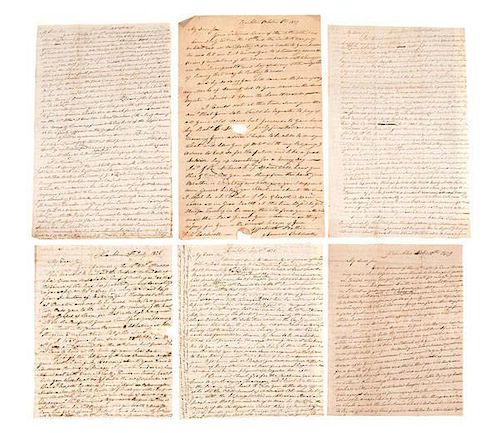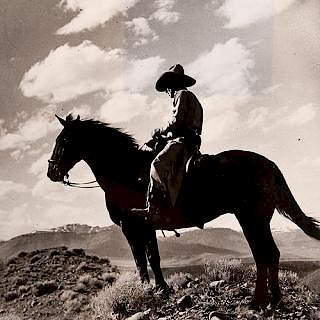Colonel Samuel Caldwell & Family, Correspondence, Franklin, Ohio, 1820s-1830s
About Seller
6270 Este Ave.
Cincinnati , OH 45232
United States
With offices in Cincinnati, Cleveland and Denver, Cowan’s holds over 40 auctions each year, with annual sales exceeding $16M. We reach buyers around the globe, and take pride in our reputation for integrity, customer service and great results. A full-service house, Cowan’s Auctions specializes in Am...Read more
Two ways to bid:
- Leave a max absentee bid and the platform will bid on your behalf up to your maximum bid during the live auction.
- Bid live during the auction and your bids will be submitted real-time to the auctioneer.
Bid Increments
| Price | Bid Increment |
|---|---|
| $0 | $25 |
| $500 | $50 |
| $1,000 | $100 |
| $2,000 | $250 |
| $5,000 | $500 |
| $10,000 | $1,000 |
| $20,000 | $2,500 |
| $50,000 | $5,000 |
| $100,000 | $10,000 |
About Auction
Jun 12, 2015 - Jun 13, 2015
Cowan's Auctions dawnie@cowans.com
- Lot Description
Lot of approx. 49 items, mainly correspondence between Colonel Samuel Caldwell and his sons, John, Robert, and James. Among his many accomplishments, Samuel Caldwell fought and defeated the British and their Indian Allies led by the legendary Chief Tecumseh in the Battle of the Thames, which secured the Northwest Frontier against future British attacks in the War of 1812. He was also a Member of the Ohio House and the Ohio Senate. The lot is comprised of the following:
-- 14pp manuscript speech;
-- 44 hand written letters, totaling 108pp, comprised of 13 letters from Col. Sam Caldwell to son John, 7 letters from John to Samuel Caldwell and others, 9 letters from Robert Caldwell to brother John, 15 letters from various associates to John Caldwell;
-- Plus 4 New York Consolidated Lottery tickets, 1829; Clinton Hotel boarding invoice, 1831; Invoice to John Caldwell from tailor, 1829 ; Citizen’s Meeting Minutes, John Caldwell, Secretary, 1832.
-- Patriotism, pride, appreciation, and zeal are folded into a 14pp speech of fiery projection to celebrate the 56th anniversary of the Declaration of Independence. Although unsigned, we believe that this was likely written by Samuel Caldwell:
Probably the Pilgrim Fathers who first landed from England on these shores of this mighty continent dreamed not that they would establish an empire extending from sea to sea and influencing beyond seas the state and conditions of the human family. They looked upon England as their mother and ever spoke of it by the endearing name of home. None other would have been used had not British oppression forced it – had not the lion attempted to prey upon the weak. A howling wilderness as far as daring fortitude could penetrate offered no great promise of protection only to the savage and the howling beasts of the forest.
We as a people hold a conspicuous place among the peoples of the world for America this favored land of ours it was reserved to rear and cherish to maturity the first tree of liberty whose branches promise to extend their protecting shade over all the nations of the earth. . . . . A spark has fled that will enkindle a flame that shall consume the already crumbling thrones of monarchs and leave not save upon the pages of history a monument of royal power.
Even now every ship on the Atlantic comes burdened with scores of Europe’s sons destined to try the pleasing realities of their dreams of the Western Hemisphere. Desolation in the old followed in the wake and footsteps of tyranny. Contrast the status of . . . . . a prince’s subjects with that of a free and independent citizen of this republic. Contrast the ignorance, superstition and debasement of the great maps of population of a regal dominion with the wisdom, intelligence and virtue of the favored sons of freedom.
Discord in some shape or other moves in every quarter of the globe.
Caldwell’s speech relates the struggles for freedom in other countries:
Great Britain trembles while the elements of revolution accumulate and seem to gather force for open violation of the national peace.
France feels sorely the ruinous consequences and desolating influence of national instability. Spain smarts under the scepter of a tyrant and the dire effects of unrestrained ambition.
Witness the situation of Eire the green emerald isle of the ocean. Her noble sons oppressed and ground to the very dust. Remember the assistance in our struggles for liberty rendered with all the ardor of the Irish Revolution. While another nation sent us Kosciusko – Poland. And while another sent a Lafayette to aid our desperate cause Ireland has sent her hundreds of names never to be forgotten in the history of those trying times.
The Princeton Theological Seminary in New Jersey, Miami University, in Oxford, OH and the US Military Academy at West Point provided the academic background as sons John and Robert Caldwell left their home in Franklin, OH, to acquire their education and determine their vocations.
The correspondence between the Caldwell brothers and their father is chronicled primarily between the years 1828-1833.
Robert was deeply invested in the study of Theology at Miami in Oxford. One letter relates the growth of the student population at Miami including members coming from the south, principally Frenchmen, six or seven have already arrived besides two or three Englishmen.
John enrolled at Princeton and in one letter to Robert speaks of religious revivals...There is a kind of wild fire, a zeal without knowledge sometimes apparent which most certainly cannot last . . . . if the head alone is filled and the heart wanting – much need not be expected. He relates his desire to visit Franklin in December and the circuitous route required…I had better get on board a vessel from New York and sail home by way of New Orleans. Would try it by horse but to cross the Alleghany at this season of the year would be a killing job. John generally struggled with his finances and speaks of possible employment. . . might become a tutor to some genteel family in the south, might get a horse if they would support me with a house. He knew of a Princeton graduate who gets $500 per year for teaching three hours per day. John tells Robert, You want to know how I like New Jersey now. I am sick of it.
John left Princeton and considered a career in the Navy. His father told him that a five year apprenticeship had to be served if he planned on being an officer. While he was at Washington, a letter from father Samuel expresses hopes that John can attend the inauguration of the venerable Jackson. [March, 1829]
Robert writes John that he has just returned from the meeting house from hearing Dr. Burges preach his whiskey sermon on intemperance. Robert proceeds to condemn all distilling operations, quote scripture about being a good example and discuss the relative morality of Franklin, OH. Franklin is more noted for morality than formerly, though the canal brings many desperate [ the sailors ] wretches – the young ladies of the village are generally pious & are young ladies still, some like to remain so.
John entered West Point. A friend wrote John that he would very much like to visit West Point and would like to view the Palisaides on the Hudson River. John’s tenure as a cadet at West Point lasted only 2 years. A letter to John Caldwell from W. Smith states that Smith considers John’s recitations among the worst that were made to me in the section room. The examination in June . . .was also the worst of any in the section. A small addition to his consternation was a letter that revealed that the lottery tickets that were purchased for him in New York were not winners.
Nothing but solid and continuous support from their father Samuel Caldwell was ever conveyed to his sons John, Robert and James. Caldwell’s letters always complimented his son’s academic and vocational choices. This continued even as he labored on behalf of Warren County as an Ohio official in Columbus.
Provenance:Descended Directly in the Caldwell Family - Shipping Info
-
SHIPPING. At the request of the buyer, Cowan's will authorize the shipment of purchased items. Shipments usually occur within two weeks after payment has been received. Shipment is generally made via UPS Ground service. Unless buyer gives special instructions, the shipping method shall be at the sole discretion of Cowan's Auctions, Inc.. Cowan's is in no way responsible for the acts or omissions of independent handlers, packers or shippers of purchased items or for any loss, damage or delay from the packing or shipping of any property.
-
- Buyer's Premium



 EUR
EUR CAD
CAD AUD
AUD GBP
GBP MXN
MXN HKD
HKD CNY
CNY MYR
MYR SEK
SEK SGD
SGD CHF
CHF THB
THB












